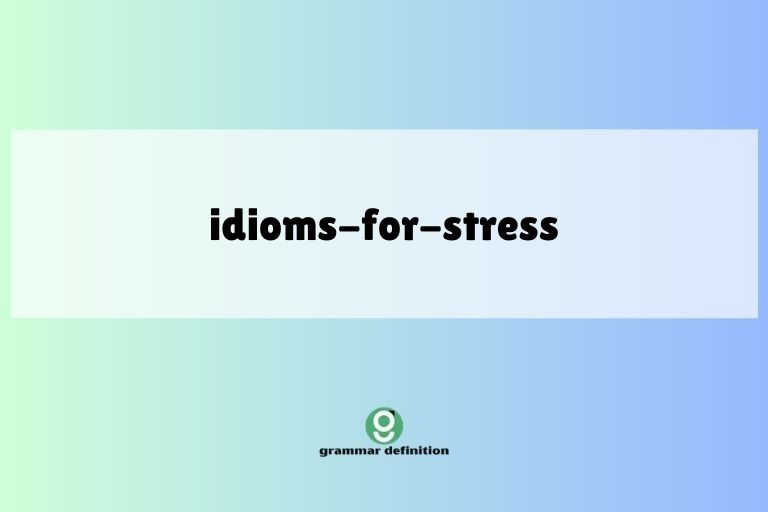Idioms for Stress: Mastering English Expressions

Stress is a universal experience, and the English language is rich with idioms to describe it. Understanding and using these idioms can significantly enhance your communication skills, making your speech more colorful and relatable.
This article provides a comprehensive guide to idioms related to stress, covering their meanings, usage, and examples. Whether you’re an English language learner or a native speaker looking to expand your vocabulary, this guide will help you express yourself more effectively when talking about stress.
Table of Contents
- Introduction
- Definition of Idioms for Stress
- Structural Breakdown
- Types and Categories of Stress Idioms
- Idioms Describing Pressure
- Idioms Describing Anxiety
- Idioms Describing Feeling Overwhelmed
- Idioms Describing Coping with Stress
- Examples of Idioms for Stress
- Examples of Pressure Idioms
- Examples of Anxiety Idioms
- Examples of Overwhelmed Idioms
- Examples of Coping Idioms
- Usage Rules for Stress Idioms
- Contextual Usage
- Register and Formality
- Common Mistakes with Stress Idioms
- Practice Exercises
- Exercise 1: Multiple Choice
- Exercise 2: Fill in the Blanks
- Exercise 3: Sentence Completion
- Advanced Topics: Nuances and Variations
- Frequently Asked Questions
- Conclusion
Definition of Idioms for Stress
Idioms are expressions whose meanings cannot be understood from the literal meanings of the individual words. They are a vital part of the English language, adding color and depth to communication.
Idioms for stress specifically refer to expressions used to describe feelings of pressure, anxiety, being overwhelmed, and the ways people cope with these feelings. These idioms often use figurative language to convey complex emotional states in a concise and relatable manner.
Understanding idioms for stress is crucial because they appear frequently in both spoken and written English. Using them correctly demonstrates a strong command of the language and an understanding of cultural nuances.
Furthermore, these idioms provide a nuanced way to express feelings that might be difficult to articulate directly. They allow speakers to convey the intensity of their stress in a way that resonates with listeners.
The function of idioms for stress is primarily to communicate emotional states and experiences related to stress in an indirect, often more vivid, way. They help to create a shared understanding between the speaker and the listener, making communication more effective and engaging.
Idioms can also serve to soften the impact of negative emotions, making them easier to discuss.
Structural Breakdown
The structure of idioms for stress varies widely, but they often involve a combination of common words used in an uncommon way. Many idioms are based on metaphors, similes, or other figures of speech.
Understanding the underlying structure can help in memorizing and using these idioms correctly.
Common structural elements include:
- Verbs + Prepositions: To be under the weather, to be on edge
- Nouns + Adjectives: A nervous wreck, a pressure cooker
- Phrases with “Stress”: Stress someone out, stress over something
- Figurative Language: Metaphors (to have a lot on one’s plate), similes (as cool as a cucumber)
The key to understanding the structure is recognizing that the individual words are not meant to be taken literally. Instead, the phrase as a whole conveys a specific meaning related to stress.
For example, “to be on edge” doesn’t literally mean standing on the edge of something; it means to be nervous and anxious.
Idioms can also be analyzed in terms of their grammatical structure. Some are simple phrases, while others are more complex clauses.
However, the grammatical structure is less important than the overall meaning and usage of the idiom.
Types and Categories of Stress Idioms
Stress idioms can be categorized based on the specific type of stress they describe. This categorization can help in understanding the nuances of each idiom and using them appropriately.
Idioms Describing Pressure
These idioms refer to situations where someone feels under pressure to perform or meet expectations. They often involve a sense of being pushed or forced to do something.
Idioms Describing Anxiety
These idioms describe feelings of worry, nervousness, and unease. They often involve a sense of fear or apprehension about the future.
Idioms Describing Feeling Overwhelmed
These idioms describe situations where someone feels like they have too much to handle and are unable to cope. They often involve a sense of being burdened or burdened by responsibilities.
Idioms Describing Coping with Stress
These idioms refer to ways people deal with stress, whether healthy or unhealthy. They often involve strategies for managing anxiety and pressure.
Examples of Idioms for Stress
This section provides a comprehensive list of idioms for stress, categorized by the type of stress they describe. Each idiom is accompanied by a definition and example sentence.
Examples of Pressure Idioms
The following table provides examples of idioms that describe pressure, along with their meanings and example sentences. Understanding these idioms can help you express the feeling of being under pressure more effectively.
| Idiom | Meaning | Example Sentence |
|---|---|---|
| Under pressure | Feeling stressed and pressured to perform | She’s under pressure to meet the deadline. |
| Up against it | Facing difficult circumstances or challenges | We’re really up against it with this project. |
| Have a lot on one’s plate | To have many responsibilities or tasks | I have a lot on my plate right now, so I can’t take on any more work. |
| Keep one’s head above water | To barely manage to survive or stay afloat | He’s just trying to keep his head above water financially. |
| On the spot | Forced to do something immediately without preparation | The boss put me on the spot by asking me to present the report without notice. |
| Sweating bullets | Extremely nervous or anxious | I was sweating bullets before the exam. |
| Against the clock | Rushing to finish something within a tight deadline | We’re working against the clock to get the project done on time. |
| To be snowed under | To be overwhelmed with a large amount of work | I’m completely snowed under with paperwork this week. |
| To be pushed to the limit | To be forced to exert maximum effort or endurance | The athletes were pushed to the limit during training. |
| To have one’s back to the wall | To be in a difficult situation with limited options | The company had its back to the wall after losing the contract. |
| To be in the hot seat | To be in a position where one is being criticized or questioned | The CEO was in the hot seat during the shareholder meeting. |
| To be walking a tightrope | To be in a precarious situation where one must be very careful | The negotiator was walking a tightrope trying to reach an agreement. |
| To carry the weight of the world on one’s shoulders | To feel burdened by many problems or responsibilities | He carries the weight of the world on his shoulders since his father passed away. |
| To be under the gun | To be under pressure to achieve a specific result | The sales team is under the gun to meet their quarterly targets. |
| To be at the end of one’s tether | To have run out of patience or endurance | After dealing with the difficult customer, she was at the end of her tether. |
| To be stretched too thin | To be trying to do too many things at once, leading to exhaustion | She’s stretched too thin trying to balance work and family. |
| To feel the pinch | To experience financial hardship or pressure | Many families are feeling the pinch due to the rising cost of living. |
| To have one’s hands full | To be very busy and have a lot to deal with | She has her hands full with three young children. |
| To be swamped | To be overwhelmed with a large amount of work or tasks | I’m completely swamped with emails this morning. |
| To be fire fighting | To be constantly dealing with urgent and unexpected problems | The IT department is always fire fighting to keep the systems running. |
| To be running around like a headless chicken | To be rushing around in a disorganized and ineffective manner | She was running around like a headless chicken trying to get everything done before the meeting. |
| To have too many irons in the fire | To be involved in too many projects or activities at once | He has too many irons in the fire and can’t focus on any one thing properly. |
| To be caught between a rock and a hard place | To be in a difficult situation with no good options | He was caught between a rock and a hard place when he had to choose between his job and his family. |
| To be walking on eggshells | To be very careful in one’s actions or words to avoid upsetting someone | He’s been walking on eggshells around his boss since the mistake happened. |
Examples of Anxiety Idioms
Here are some idioms related to anxiety, providing different ways to express feelings of worry and nervousness.
| Idiom | Meaning | Example Sentence |
|---|---|---|
| On edge | Nervous and anxious | I’ve been on edge all day waiting for the test results. |
| Butterflies in one’s stomach | Feeling nervous, especially before an event | I had butterflies in my stomach before my presentation. |
| A nervous wreck | Extremely nervous and anxious | She was a nervous wreck before the wedding. |
| Biting one’s nails | Showing anxiety through a nervous habit | He was biting his nails while waiting for the interview. |
| Climbing the walls | Feeling restless and anxious | I was climbing the walls waiting for the package to arrive. |
| In a cold sweat | Experiencing a sudden, anxious sweat | I woke up in a cold sweat after having a nightmare. |
| Like a cat on a hot tin roof | Very restless and agitated | He’s been like a cat on a hot tin roof since he lost his job. |
| Losing sleep over something | Worrying about something so much that it affects one’s sleep | I’ve been losing sleep over the upcoming deadline. |
| Stressed out | Feeling overwhelmed by stress | I’m so stressed out with all this work. |
| Tense up | To become physically tense due to anxiety | I tense up whenever I hear a loud noise. |
| To be beside oneself | To be extremely agitated or distraught | She was beside herself with worry when her son was late. |
| To be worried sick | To be extremely worried | We were worried sick when we couldn’t reach him. |
| To have ants in one’s pants | To be unable to sit still because of nervousness or excitement | The kids had ants in their pants waiting for the school bell to ring. |
| To be on pins and needles | To be in a state of anxious suspense | We were on pins and needles waiting for the election results. |
| To be uptight | To be tense and anxious | He’s been very uptight since the project started. |
| To get cold feet | To become nervous or scared before an important event | He got cold feet before his wedding. |
| To have a cow | To become very upset or anxious | She had a cow when she found out about the mistake. |
| To have a nervous breakdown | To experience a period of mental or emotional collapse | He had a nervous breakdown after years of overwork. |
| To jump out of one’s skin | To be startled or frightened | I jumped out of my skin when I heard the loud bang. |
| To make one’s blood run cold | To cause someone to feel very frightened | The horror movie made my blood run cold. |
| To shake like a leaf | To tremble uncontrollably due to fear or nervousness | She was shaking like a leaf before her performance. |
| To sweat something out | To wait anxiously for something to happen | We’re sweating it out waiting for the exam results. |
| To take its toll | To have a negative effect on someone’s health or well-being | The stress of the job is taking its toll on her health. |
| To tear one’s hair out | To be extremely frustrated or anxious | I was tearing my hair out trying to solve the problem. |
Examples of Overwhelmed Idioms
The following idioms describe the feeling of being overwhelmed, helping you express when you have too much to handle.
| Idiom | Meaning | Example Sentence |
|---|---|---|
| Overwhelmed | Feeling like one cannot cope with everything | I’m completely overwhelmed with work and family responsibilities. |
| Burnt out | Exhausted from prolonged stress | She’s burnt out from working long hours. |
| At the end of one’s rope | Having no more patience or strength to cope | I’m at the end of my rope with this situation. |
| Drowning in work | Having too much work to handle | I’m drowning in work this week. |
| In over one’s head | Involved in something that one cannot handle | He’s in over his head with this project. |
| Stretched thin | Having too many demands on one’s time and energy | She’s stretched thin trying to balance work and family. |
| Up to one’s ears | Deeply involved in something, often too much | I’m up to my ears in paperwork. |
| To be frazzled | To be completely exhausted and overwhelmed | She was frazzled after dealing with the difficult client. |
| To be running on fumes | To be operating with very little energy or resources | I’m running on fumes after working all night. |
| To have had it up to here | To have reached the limit of one’s patience or tolerance | I’ve had it up to here with the constant complaints. |
| To be snowed under | To be overwhelmed with a large amount of work | I’m completely snowed under with paperwork this week. |
| To be swamped | To be overwhelmed with a large amount of work or tasks | I’m completely swamped with emails this morning. |
| To be maxed out | To have reached the limit of one’s capacity or resources | I’m completely maxed out and can’t take on any more projects. |
| To have one’s plate full | To have many responsibilities or tasks to handle | She has her plate full with work and family commitments. |
| To be at one’s wit’s end | To be so frustrated or stressed that one doesn’t know what to do | I’m at my wit’s end trying to solve this problem. |
Examples of Coping Idioms
These idioms describe ways people cope with stress, whether healthy or unhealthy. They provide a range of expressions to discuss stress management strategies.
| Idiom | Meaning | Example Sentence |
|---|---|---|
| Keep a cool head | Stay calm under pressure | It’s important to keep a cool head in a crisis. |
| Take a chill pill | Relax and calm down | You need to take a chill pill and stop worrying so much. |
| Blow off steam | Release pent-up energy or frustration | I went for a run to blow off steam after the argument. |
| Let off steam | Release pent-up energy or frustration | He plays video games to let off steam. |
| Keep it together | Remain composed and in control | She tried to keep it together during the funeral. |
| Pull oneself together | Regain control of one’s emotions | He needed to pull himself together after receiving the bad news. |
| Take one day at a time | Focus on the present and not worry about the future | I’m just taking one day at a time to manage my stress. |
| Turn a blind eye | Ignore something that is causing stress | Sometimes you have to turn a blind eye to minor issues. |
| To bite the bullet | To face a difficult situation with courage | I had to bite the bullet and tell him the truth. |
| To grin and bear it | To endure something unpleasant with a smile | She had to grin and bear it during the long meeting. |
| To keep one’s chin up | To remain cheerful and optimistic despite difficulties | Even though things are tough, you have to keep your chin up. |
| To take a load off one’s mind | To relieve stress or worry | Talking to a friend helped take a load off my mind. |
| To take the edge off | To reduce the intensity of something, such as stress or pain | A cup of tea can take the edge off my anxiety. |
| To weather the storm | To survive a difficult period | We managed to weather the storm during the recession. |
| To get something off one’s chest | To express something that has been bothering you | I needed to get it off my chest and tell her how I felt. |
Usage Rules for Stress Idioms
Using idioms correctly requires understanding their specific meanings and contexts. It’s important to consider the formality of the situation and the audience when using idioms.
Contextual Usage
The meaning of an idiom can change depending on the context. Always consider the situation and the overall message you are trying to convey.
For example, “to be under the weather” means to be slightly ill, not necessarily stressed, but it can be used to describe feeling stressed if the illness is due to stress.
Register and Formality
Idioms are generally more appropriate in informal settings. In formal writing or presentations, it’s best to use more direct language.
However, some idioms are more widely accepted and can be used in semi-formal contexts.
Informal: “I’m totally stressed out!”
Formal: “I am experiencing a high level of stress.”
Common Mistakes with Stress Idioms
One common mistake is taking idioms literally. Remember that the meaning of an idiom is not the sum of the meanings of its individual words.
Another mistake is using idioms in inappropriate contexts, such as formal writing.
Here are some examples of common mistakes:
| Incorrect | Correct | Explanation |
|---|---|---|
| “I have a lot of plates on my table.” | “I have a lot on my plate.” | The idiom is “have a lot on one’s plate,” not “plates on my table.” |
| “She was climbing the walls literally.” | “She was climbing the walls (metaphorically).” | “Climbing the walls” is an idiom meaning restless or anxious; it’s rarely literal. |
| “He is under the water with work.” | “He is drowning in work.” | The correct idiom is “drowning in work,” not “under the water.” |
Practice Exercises
These exercises will help you practice using idioms for stress correctly. Each exercise includes multiple questions with answers provided at the end.
Exercise 1: Multiple Choice
Choose the correct idiom to complete each sentence.
| Question | Options | Answer |
|---|---|---|
| 1. She was so nervous before the presentation that she had __________. | (a) butterflies in her stomach (b) ants in her pants (c) a frog in her throat | (a) butterflies in her stomach |
| 2. He’s been working so hard that he’s completely __________. | (a) burnt out (b) fired up (c) watered down | (a) burnt out |
| 3. I’m __________ with all the emails I have to answer. | (a) drowning (b) swimming (c) floating | (a) drowning |
| 4. You need to __________ and stop worrying so much. | (a) take a chill pill (b) swallow a bitter pill (c) pop a happy pill | (a) take a chill pill |
| 5. It’s important to __________ when dealing with a crisis. | (a) keep a cool head (b) lose your head (c) bury your head | (a) keep a cool head |
| 6. After the argument, I went for a run to __________. | (a) blow off steam (b) build up steam (c) run out of steam | (a) blow off steam |
| 7. He had to __________ and tell her the truth, even though it was difficult. | (a) bite the bullet (b) chew the fat (c) swallow the frog | (a) bite the bullet |
| 8. She’s __________ trying to balance work and family. | (a) stretched thin (b) spread thick (c) watered down | (a) stretched thin |
| 9. I’m __________ with the constant complaints. | (a) at the end of my rope (b) on top of the world (c) in the middle of nowhere | (a) at the end of my rope |
| 10. We managed to __________ during the recession. | (a) weather the storm (b) chase the rainbow (c) ride the wave | (a) weather the storm |
Exercise 2: Fill in the Blanks
Fill in the blanks with the correct idiom from the list below.
Idiom List: on edge, a nervous wreck, have a lot on my plate, keep my head above water, under pressure
| Question | Answer |
|---|---|
| 1. I’ve been __________ all day waiting for the test results. | on edge |
| 2. She was __________ before the wedding. | a nervous wreck |
| 3. I __________ right now, so I can’t take on any more work. | have a lot on my plate |
| 4. He’s just trying to __________ financially. | keep his head above water |
| 5. She’s __________ to meet the deadline. | under pressure |
| 6. With so much to do, I feel like I am constantly __________ . | Under pressure |
| 7. The constant demands from work and family leave me feeling __________ . | On edge |
| 8. Before every major performance, the lead actor becomes __________ . | A nervous wreck |
| 9. Balancing two jobs is tough, but I manage to __________ . | Keep my head above water |
| 10. As the project manager, I __________ to ensure everything is completed on time. | have a lot on my plate |
Exercise 3: Sentence Completion
Complete each sentence using an appropriate idiom for stress.
| Question | Answer |
|---|---|
| 1. After working non-stop for weeks, he was completely __________. | burnt out. |
| 2. I couldn’t sleep last night because I was __________ about the interview. | losing sleep |
| 3. She decided to __________ and tell her boss she needed help. | get it off her chest |
| 4. He tries to __________ by going to the gym after work. | blow off steam |
| 5. With so many deadlines approaching, I feel like I’m __________. | drowning in work |
| 6. The constant criticism from his manager caused him to __________. | lose sleep over it |
| 7. To deal with the overwhelming stress, she decided to __________. | take a chill pill |
| 8. Despite the challenging circumstances, it’s important to __________. | keep a cool head |
| 9. He realized he was __________ when he started making careless mistakes. | burnt out |
| 10. Knowing I had to present made me __________. | have butterflies in my stomach |
Advanced Topics: Nuances and Variations
Some idioms have subtle variations in meaning depending on the context. For example, “to be under the weather” can mean to be slightly ill or to be feeling generally unwell due to stress.
Understanding these nuances requires careful attention to the surrounding text and the speaker’s intent.
Additionally, some idioms have regional variations. An idiom that is common in one English-speaking country may be less common or have a slightly different meaning in another.
Being aware of these regional differences can help avoid misunderstandings.
Advanced learners should also pay attention to the connotations of different idioms. Some idioms have a more negative or humorous connotation than others.
Choosing the right idiom can help convey the desired tone and attitude.
Frequently Asked Questions
Here are some frequently asked questions about idioms for stress.
- What are idioms?
Idioms are expressions whose meanings cannot be understood from the literal meanings of the individual words. They are a vital part of the English language, adding color and depth to communication. - Why is it important to learn idioms for stress?
Understanding idioms for stress is crucial because they appear frequently in both spoken and written English. Using them correctly demonstrates a strong command of the language and an understanding of cultural nuances. - How can I learn idioms for stress effectively?
One effective way to learn idioms is to study them in context. Pay attention to how idioms are used in books, movies, and conversations. Create flashcards with the idiom, its meaning, and an example sentence. Practice using the idioms in your own speech and writing. - Are idioms for stress appropriate in formal writing?
Generally, idioms are more appropriate in informal settings. In formal writing or presentations, it’s best to use more direct language. However, some idioms are more widely accepted and can be used in semi-formal contexts. - What is the difference between an idiom and a metaphor?
A metaphor is a figure of speech that compares two unlike things without using “like” or “as.” An idiom is a phrase whose meaning is different from the literal meaning of its individual words. Some idioms can be based on metaphors, but not all metaphors are idioms. - Can the meaning of an idiom change depending on the context?
Yes, the meaning of an idiom can change depending on the context. Always consider the situation and the overall message you are trying to convey. - How do I avoid making mistakes when using idioms?
Avoid taking idioms literally. Remember that the meaning of an idiom is not the sum of the meanings of its individual words. Also, be mindful of the context and audience when using idioms. - Where can I find more resources for learning idioms?
There are many online resources, including dictionaries, websites, and apps, that can help you learn idioms. Look for resources that provide definitions, examples, and practice exercises.
Conclusion
Mastering idioms for stress is a valuable skill for anyone looking to improve their English language proficiency. These expressions add color and depth to your communication, allowing you to express complex emotions in a concise and relatable manner.
By understanding the meanings, usage rules, and common mistakes associated with these idioms, you can communicate more effectively and confidently.
Remember to practice using these idioms in your daily conversations and writing.






